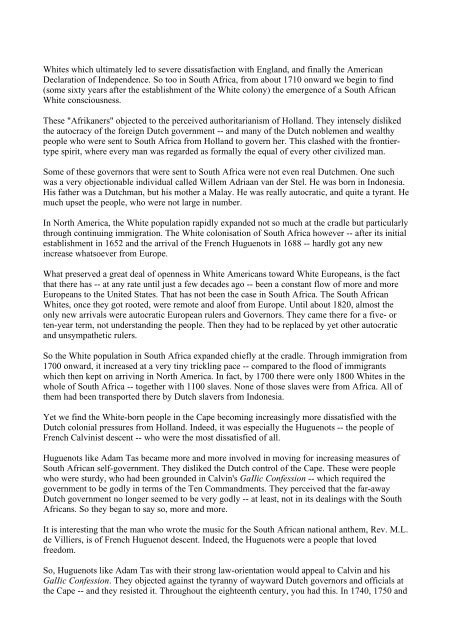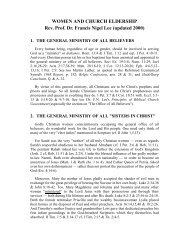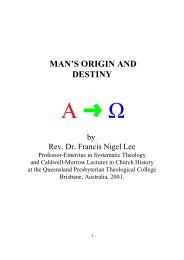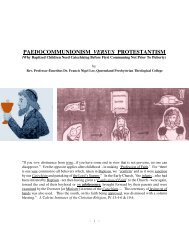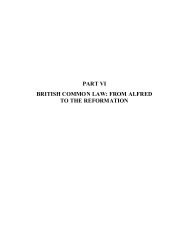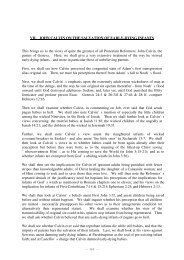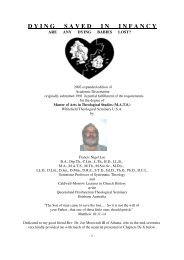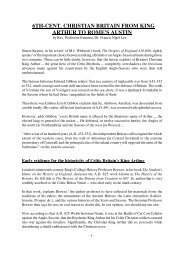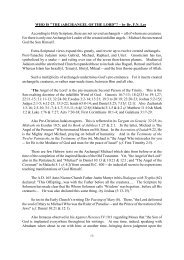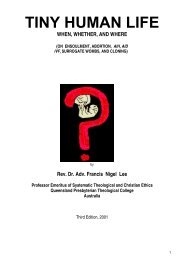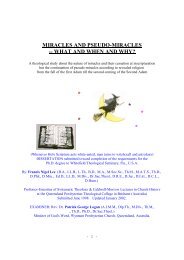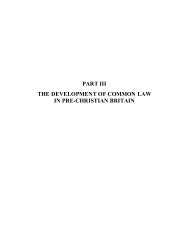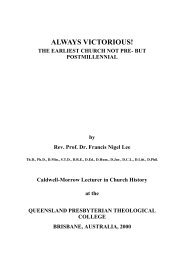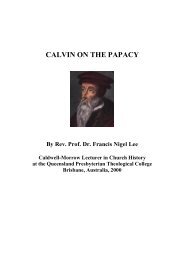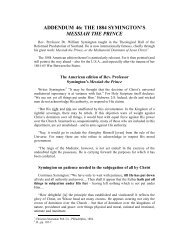THE CHRISTIAN AFRIKANERS - The Works of F. N. Lee
THE CHRISTIAN AFRIKANERS - The Works of F. N. Lee
THE CHRISTIAN AFRIKANERS - The Works of F. N. Lee
You also want an ePaper? Increase the reach of your titles
YUMPU automatically turns print PDFs into web optimized ePapers that Google loves.
Whites which ultimately led to severe dissatisfaction with England, and finally the AmericanDeclaration <strong>of</strong> Independence. So too in South Africa, from about 1710 onward we begin to find(some sixty years after the establishment <strong>of</strong> the White colony) the emergence <strong>of</strong> a South AfricanWhite consciousness.<strong>The</strong>se "Afrikaners" objected to the perceived authoritarianism <strong>of</strong> Holland. <strong>The</strong>y intensely dislikedthe autocracy <strong>of</strong> the foreign Dutch government -- and many <strong>of</strong> the Dutch noblemen and wealthypeople who were sent to South Africa from Holland to govern her. This clashed with the frontiertypespirit, where every man was regarded as formally the equal <strong>of</strong> every other civilized man.Some <strong>of</strong> these governors that were sent to South Africa were not even real Dutchmen. One suchwas a very objectionable individual called Willem Adriaan van der Stel. He was born in Indonesia.His father was a Dutchman, but his mother a Malay. He was really autocratic, and quite a tyrant. Hemuch upset the people, who were not large in number.In North America, the White population rapidly expanded not so much at the cradle but particularlythrough continuing immigration. <strong>The</strong> White colonisation <strong>of</strong> South Africa however -- after its initialestablishment in 1652 and the arrival <strong>of</strong> the French Huguenots in 1688 -- hardly got any newincrease whatsoever from Europe.What preserved a great deal <strong>of</strong> openness in White Americans toward White Europeans, is the factthat there has -- at any rate until just a few decades ago -- been a constant flow <strong>of</strong> more and moreEuropeans to the United States. That has not been the case in South Africa. <strong>The</strong> South AfricanWhites, once they got rooted, were remote and alo<strong>of</strong> from Europe. Until about 1820, almost theonly new arrivals were autocratic European rulers and Governors. <strong>The</strong>y came there for a five- orten-year term, not understanding the people. <strong>The</strong>n they had to be replaced by yet other autocraticand unsympathetic rulers.So the White population in South Africa expanded chiefly at the cradle. Through immigration from1700 onward, it increased at a very tiny trickling pace -- compared to the flood <strong>of</strong> immigrantswhich then kept on arriving in North America. In fact, by 1700 there were only 1800 Whites in thewhole <strong>of</strong> South Africa -- together with 1100 slaves. None <strong>of</strong> those slaves were from Africa. All <strong>of</strong>them had been transported there by Dutch slavers from Indonesia.Yet we find the White-born people in the Cape becoming increasingly more dissatisfied with theDutch colonial pressures from Holland. Indeed, it was especially the Huguenots -- the people <strong>of</strong>French Calvinist descent -- who were the most dissatisfied <strong>of</strong> all.Huguenots like Adam Tas became more and more involved in moving for increasing measures <strong>of</strong>South African self-government. <strong>The</strong>y disliked the Dutch control <strong>of</strong> the Cape. <strong>The</strong>se were peoplewho were sturdy, who had been grounded in Calvin's GaIlic Confession -- which required thegovernment to be godly in terms <strong>of</strong> the Ten Commandments. <strong>The</strong>y perceived that the far-awayDutch government no longer seemed to be very godly -- at least, not in its dealings with the SouthAfricans. So they began to say so, more and more.It is interesting that the man who wrote the music for the South African national anthem, Rev. M.L.de Villiers, is <strong>of</strong> French Huguenot descent. Indeed, the Huguenots were a people that lovedfreedom.So, Huguenots like Adam Tas with their strong law-orientation would appeal to Calvin and hisGalIic Confession. <strong>The</strong>y objected against the tyranny <strong>of</strong> wayward Dutch governors and <strong>of</strong>ficials atthe Cape -- and they resisted it. Throughout the eighteenth century, you had this. In 1740, 1750 and


